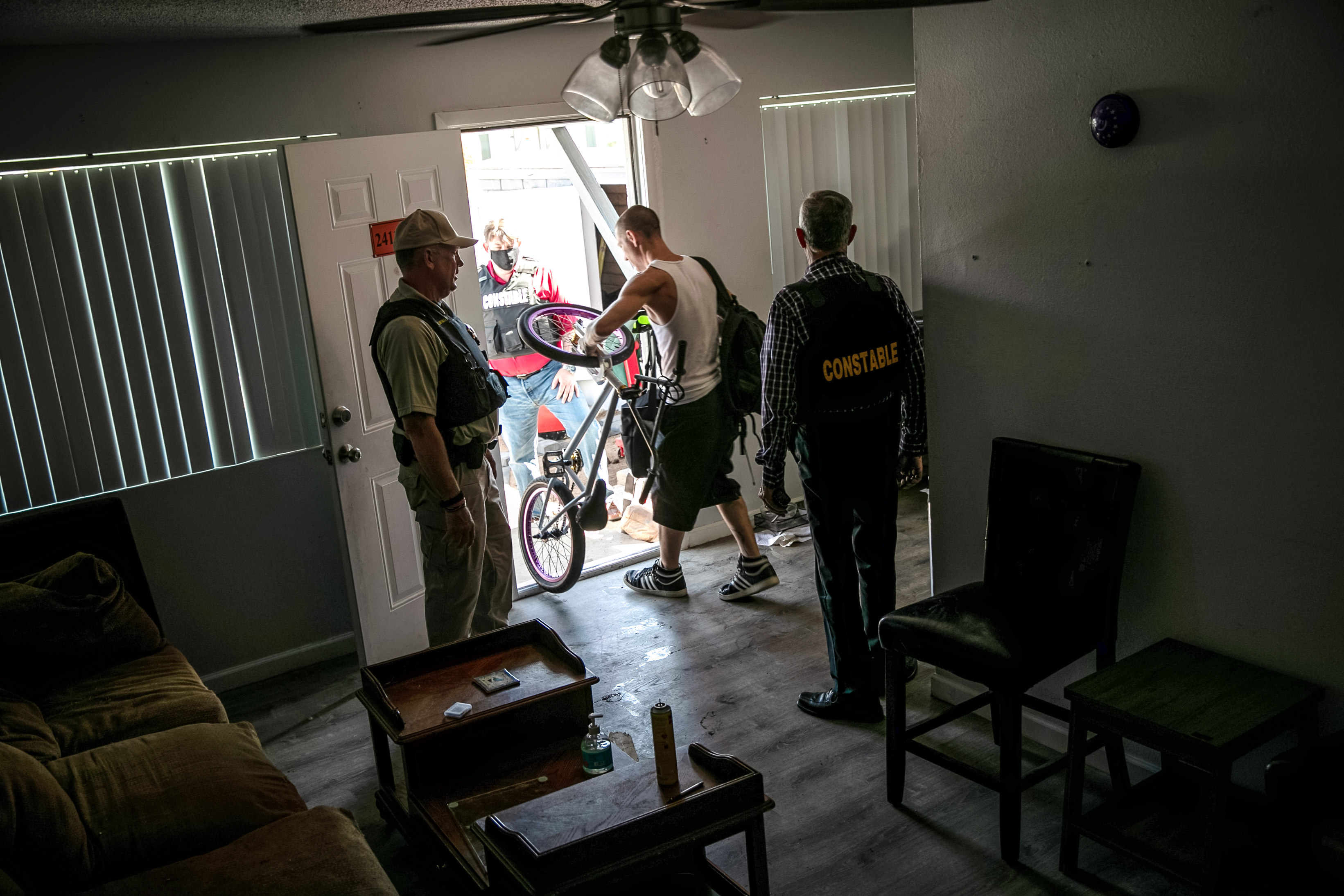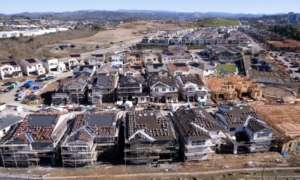PHOENIX—A property manager in Phoenix says that dealing with itinerant “squatters” is one of the least pleasant parts of the real estate business.
Sometimes, you can’t control what happens, Calvin Favata with Your Holdings told The Epoch Times.
Rashaad Johnson, 29, had been renting a Your Holdings unit in South Phoenix for about two months and never had any trouble. But he was a “nice guy” who sometimes let squatters who lived in the vacant house across the street use his bathroom shower, Favata said.
Favata said the shower situation soon “got out of hand,” and the company had to stop it.
“We even put padlocks and deadbolt [locks] on the bathroom doors so they couldn’t use it,” Favata said.
On Oct. 14, one of the squatters asked Johnson to use the shower, but when he refused, the man, dressed in body armor, allegedly told Johnson he was going to get his gun.
The man returned and killed Johnson, as well as wounding another tenant, a 32-year-old woman who was with him.
Phoenix police charged Refugio Jimenez, 49, with first-degree murder and burglary, including misconduct involving body armor, felony drug possession, and other crimes.
Favata said that Johnson’s senseless death was apparently “over a shower.”
“Since then, I’ve been here every day. We’ve got cameras back up,” Favata told The Epoch Times as he picked up tools from the back of his company truck outside the residence.
He said squatters have always been an issue and it’s hard to get rid of them. The situation has gotten worse in the Phoenix area in recent months.


(Top) Phoenix property manager Calvin Favata stands in front of the residence where one of his tenants was allegedly shot to death by a suspected squatter on Oct. 14, 2024. (Bottom) The house across the street where six alleged squatters were staying, on Nov. 2, 2024. (Allan Stein/The Epoch Times)
“It’s pretty much any house you see that’s vacant. I thought it would be pretty much here and there,” Favata said.
“The one [property] we just bought, I had to do all the electrical and plumbing. They took all the copper out of the house.”
‘Snowbirds’ Targeted
Scott Blake is the constable for the Hassayampa District, one of the largest districts in Arizona’s Maricopa County. The district includes Phoenix.
Blake, like Favata, said he has seen more squatters in recent months. The situation appears driven by increasing homelessness, rent costs, and the snowbird phenomenon.
In the summer, thousands of snowbirds will leave their Arizona property for milder climates and return in the winter. Some seasonal residents return to find a total stranger living in their home and refusing to leave.
“There is a group of people in society that wants to live for as little as possible. If they can live for free, they do,” Blake said.
“It’s more frequent than it ever was. I see it once a week now. A lot of times, when the squatter is confronted by law enforcement, they will leave. It’s very rare that it goes as far as me.”
Blake said that the shooting in Phoenix shows what can happen when a landlord or tenant confronts an alleged squatter.
Recent incidents in other states have put the issue in the spotlight.

A man looks to get a view of an abandoned mansion covered in graffiti in the Hollywood Hills neighborhood of Los Angeles on Sept. 20, 2024. Neighbors said the house has been a refuge for squatters coming and going for over two years. (Robyn Beck/ AFP/AFP via Getty Images)
Two suspected squatters were arrested in March for allegedly killing an apartment resident in New York City and stuffing her body inside a duffel bag in Pennsylvania, according to news reports.
In October, Los Angeles police said that a homeowner in the Van Nuys neighborhood of the city was attacked by a suspected squatter. The homeowner managed to pin down the trespasser until officers arrived.
Another alleged squatter was arrested in May for first- and second-degree murder in the fatal shooting of two men hired to clean a house, local media reported.
Blake said that getting rid of a squatter is often a complicated matter, and each state has its version of “squatters rights.”
According to TurboTenant.com, squatters in Arizona can make landlords’ lives extremely difficult once they’ve settled into a property.
“Even more anxiety-inducing, if a squatter stays on a property long enough and meets specific requirements, they might eventually be able to claim it as their own through a legal process called adverse possession,” the website stated.
A notice to vacate is issued to squatters to leave the property within a certain period to begin the eviction process under Arizona law. The next step is to file an eviction lawsuit to remove them.
Blake said that the entire process can take up to 21 days.
“In Arizona, we are blessed with one of the fastest eviction procedures in the United States,” he said. “In some states like California, the process can take as long as a year.”
An ‘Invasion’ of Squatters
The Apartment Association of Greater Los Angeles (AAGLA) reports that squatters have become a significant problem in California and across the United States.
“Thousands of properties across America are being invaded by squatters, who move in and live rent-free, causing major damage, or in worse cases, injury or death to property owners—and there’s really no expedient, easy legal way for property owners or the police to remove them,” according to the organization’s website.

A newly erected fence blocks the front of a vacant home that Moms 4 Housing activists occupied during a monthslong protest, which ended in a court ordered eviction, in Oakland, Calif., on Jan. 28, 2020. (Philip Pacheco/AFP via Getty Images)
The group said the internet and dark forums have become a clearinghouse for advice on how to break into someone else’s home and “establish a right to be there.”
Blake said that, in some cases, a squatter may produce a fake lease to show police, who then treat squatting as a civil matter.
“They could make up a really simple one or go online and get one. One of the ways to protect yourself—especially in the retirement communities—is to use passwords on your computer,” Blake said.
“You don’t want someone who comes in and decides to squat in your house to get onto your computer and see that it’s not password protected. They'll send that lease to themselves from you.”
The AAGLA noted that authorities are often slow to intervene in what they perceive to be a non-criminal or civil issue.
Some property owners have turned to armed vigilante squatter removers who move in on the squatters, making life difficult for them, so they leave.
Favata said that the part he finds frustrating is when the law seems to favor squatters over landlords.
“We had an incident at our other house. We had a bunch of people that weren’t paying rent,” he said, and the company put plywood on the doors when the squatters weren’t home.
“Then the cops came, broke down the plywood, and let everybody back into their rooms,” Favata said.
Another homeowner in New York City was arrested in March after changing the locks on her doors to keep out squatters, despite having the deed in hand, according to local media.
In New York state, a landlord cannot disable electricity, change locks, or seize property from someone who claims to be a tenant.
At least four states are trying to pass anti-squatter bills to address the problem, including New York with proposed Senate Bill 8867. The bill would allow law enforcement to evict squatters right away with a sworn complaint from the property owner.
Florida recently passed House Bill 621, which makes it easier to evict squatters as long as they are not involved in a legal dispute.
Squatter Bill Killed in Arizona
In February, Arizona lawmakers passed a bipartisan bill that would have allowed law enforcement to immediately remove suspected squatters from a residence.
Arizona Gov. Katie Hobbs, a Democrat, vetoed the bill in April, saying it “fails to leverage existing mechanisms, respect the due process rights of lawful tenants, and minimize unintended consequences, such as for victims of domestic violence.”
Arizona state Sen. Wendy Rogers, a Republican and the bill’s prime sponsor, said it was a collaborative and well-thought-out piece of legislation.
She described squatting as a growing problem and said that property rights are “fundamental.”
“Our senate legal experts, as well as our Arizona House caucus counterparts, were integrally helpful, making it as robust as possible,” Rogers told The Epoch Times.
“In a timely manner, we were even able to incorporate all the pragmatic aspects of Florida’s squatters law, which had passed a few weeks earlier to include Florida’s handy checklist for law enforcement.”
The bill’s cosponsor, Arizona Sen. John Kavanaugh, a Republican, said the bill would have made it easier for homeowners to evict squatters and avoid the legal expense.

Rep. John Kavanagh (R-Ariz.) at the America the Great tour panel discussion hosted by Heritage Action for America at the Scottsdale Resort at McCormick Ranch in Scottsdale, Ariz., on Oct. 14, 2022. Sen. (Rebecca Noble/Getty Images)
“These aren’t tenants who haven’t paid their rent or are accused of breaking their lease. We’re talking about people who have no contract with the property owner, who basically break into a property and just start living there,” Kavanaugh told The Epoch Times.
“It’s difficult for the police to remove them. You have to go through court processes and hearings.”
Kavanaugh said the Oct. 14 shooting in Phoenix shows how encountering a squatter can sometimes turn violent.
“At all levels, this is a terrible crime. If somebody shoots you, it’s at the highest level of horrific,” Kavanaugh said.
“But to come home and discover you can’t live in your house because squatters moved in, to look in the window and see all sorts of damage and destruction and filth in the home that you built and maintained, is all so horrific.
“That’s why these people have to be removed quickly, prosecuted for the damage they do for the trespass, both as a matter of justice and deterrent to those who would do this.”
Some lawmakers noted that squatting is also tied to illegal immigration.
In April, U.S. Rep. Dan Meuser (R-Pa.) introduced the Safeguarding Homes from Illegal Entry, Living and Dwelling Act, or SHIELD Act. Under the bill, trespassing and squatting would be a deportable offense for illegal immigrants.
“This legislation has become glaringly necessary due to the recent surge in cases of illegal aliens squatting in American homes,” Meuser said in a statement.
“The dramatic increase in the number of illegal immigrants squatting in American homes is yet another example of how the disastrous situation at our southern border is impacting communities across the country.”

An abandoned mansion covered in graffiti in the Hollywood Hills neighborhood of Los Angeles on Sept. 20, 2024. Neighbors said the house has been a refuge for squatters coming and going for over two years. (Robyn Beck/ AFP/AFP via Getty Images)
Tips for Home Protection
Blake said the best thing homeowners can do is check on their property when they are away for an extended period.
He said that could include asking a relative or neighbor to watch for trespassers or hiring a professional house-sitting service.
“In Arizona, the situation is this: If you come home and find somebody inside your home if the person who is squatting or occupying the house produces a lease,” it becomes a civil matter, Blake said.
Blake said it’s essential that the home “not look empty.”
He recommends installing an alarm system, security cameras, and motion-sensing lights in and out of the home and locking all doors and windows, including all garage doors.
He said a “for rent” sign is not a good idea, as it suggests that the home may be vacant.
Under no circumstances should you confront suspected squatters directly, but call law enforcement right away, he said.
“You never know how many people you’re going to find in there,” Blake said.
Ten states have enacted Castle Doctrine laws that allow homeowners to use deadly force to protect themselves within their homes without the obligation to retreat.
Arizona is one of the 20 “stand your ground” states where a person does not have to retreat when faced with a threatening situation. Ten states require a person to retreat.
Blake said that stricter laws against squatting are necessary and that the issue is “probably going to get worse” before it gets better.

















